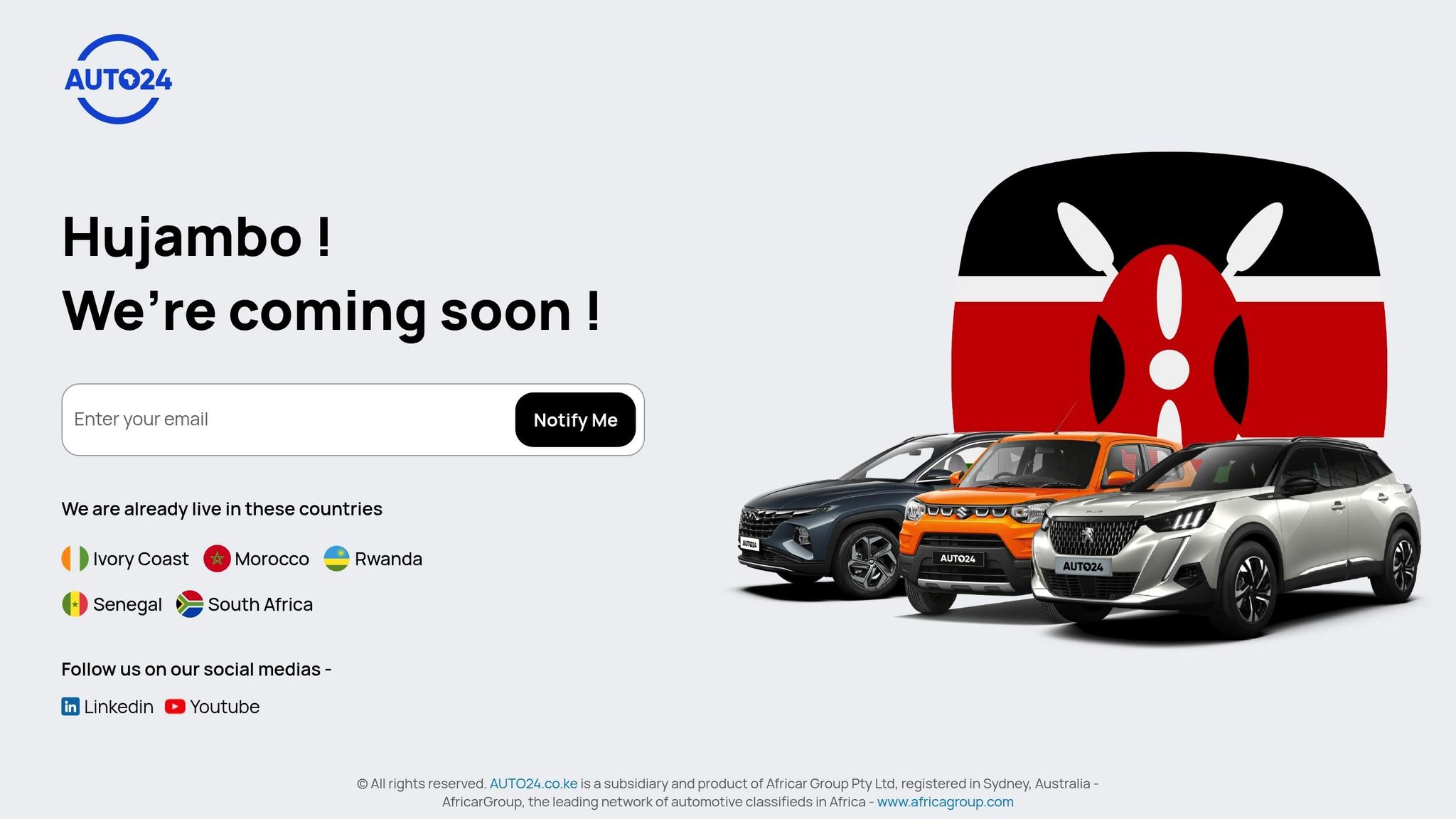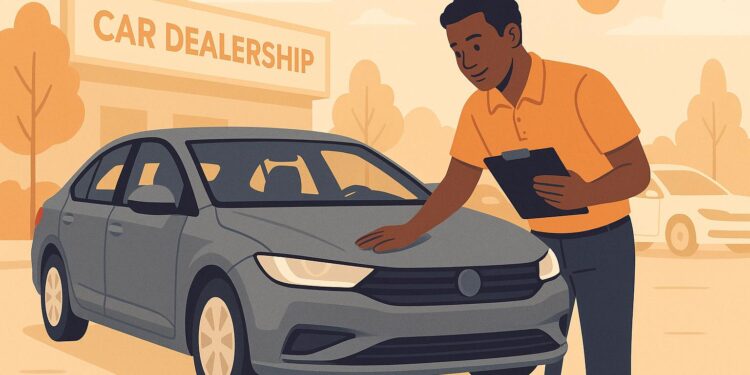Buying a car in Kenya can be risky if you’re not cautious. Scams like fake documents, odometer tampering, and deposit fraud are common. Here’s how to protect yourself:
- Check Documents: Verify logbooks, import papers, and insurance with NTSA and KRA portals. Look for watermarks, serial numbers, and holograms.
- Inspect the Car: Check the engine, mileage, undercarriage, and interior for inconsistencies. Hire a mechanic for a detailed review.
- Avoid Fake Sellers: Be wary of stock photos, unrealistically low prices, and sellers who avoid in-person meetings.
- Secure Payment & Meetings: Use traceable payment methods like bank transfers. Meet in safe, public locations like banks or police stations.
Stay vigilant. If something feels off, walk away. Always verify documents and inspect the car to avoid losing money.
Top 5 Ways Car Dealers will scam you in Kenya | Exposing …
Types of Car Scams in Kenya
Avoid falling victim to car scams by knowing what to look for. Below are common scams and how to spot them.
Document Forgery
Scammers often forge key documents like logbooks, import papers, and transfer records. Be cautious if you notice:
- Missing or incorrect security watermarks
- Serial numbers that don’t match
- Poor-quality paper or printing
- Misaligned or fake official stamps
Mileage Fraud
Odometer tampering is another trick to inflate a car’s value. Signs of this include:
- Interior wear and tear that doesn’t match the mileage
- Service records showing higher mileage than the odometer
- Odd or inconsistent digital displays
Down Payment Scams
These scams often involve pressuring buyers into quick payments. Watch out for:
- Claims of "multiple interested buyers" to create urgency
- Prices that seem too low for the market
- Requests for deposits without allowing you to view the car in person
- Delays or excuses when it comes to providing proper documentation
False Sellers and Listings
Fake car listings are common on online platforms. Here’s how to identify and avoid them:
| Red Flag | Tactic Used | How to Protect Yourself |
|---|---|---|
| Stock Photos | Using generic images | Ask for recent, specific car photos |
| Unrealistic Pricing | Prices far below market value | Research and compare market rates |
| Limited Contact Methods | Only offers WhatsApp or email | Insist on meeting in a secure location |
| Unusual Payment Terms | Requests for untraceable payments | Use secure, traceable payment methods |
Always verify the seller’s identity and check vehicle records thoroughly to avoid being scammed.
Document Verification Steps
Follow these steps to verify your vehicle documents effectively.
Vehicle History Check
Start by visiting the NTSA portal at tims.ntsa.go.ke. Here, you can confirm details like ownership, registration, tax compliance, insurance status, and accident history. Make sure the vehicle’s VIN and engine number match the provided documents – any discrepancy could signal tampering.
Identifying Fake Documents
Kenyan vehicle documents come with specific security features. Use this table to verify them:
| Document Type | Security Features | How to Verify |
|---|---|---|
| Logbook | Watermark, UV fibers, serial number | Use UV light to check features and confirm the serial number with NTSA records. |
| Import Papers | KRA stamp, customs clearance number | Verify details through the KRA portal. |
| Insurance Certificate | QR code, hologram | Scan the QR code and check with the insurer’s database. |
| Transfer Forms | Official NTSA letterhead, unique reference number | Cross-check the details with NTSA records. |
Kenya Vehicle Papers Guide
To ensure a legal purchase, confirm these key documents:
-
Original Logbook
- Must be the current blue version.
- Verify clear ownership history.
- Check for intact security features.
-
Valid Insurance Certificate
- Confirm the expiration date, type of coverage, and details with your insurer.
-
KRA Import Declaration Form (IDF)
- Essential for imported vehicles.
- Ensure duty payment details and vehicle specifications match.
-
Transfer Documents
- The owner’s ID should match the logbook details.
- Ensure the original transfer forms and PIN certificates from both parties are included.
Take clear photos of all documents and, if in doubt, consult an agent or lawyer before making any payment. For real-time verification, contact NTSA through their official channels.
Proper document checks are critical to avoiding car scams in Kenya.
Vehicle Inspection Guide
Make sure to perform a detailed physical inspection to avoid buying a car with hidden issues.
Inspection Steps
| Inspection Area | What to Check | Red Flags |
|---|---|---|
| Exterior | Look for consistent paint, even panel gaps, and signs of rust | Mismatched paint, uneven gaps, or bubbling paint |
| Engine Bay | Check fluid levels, hoses, and battery terminals | Oil leaks, corroded terminals, or damaged hoses |
| Undercarriage | Inspect the frame, exhaust system, and suspension | Rust spots, welding marks, or fluid drips |
| Interior | Test dashboard lights, seat condition, and electrical features | Warning lights, torn seats, or non-working electronics |
| Documentation | Verify the VIN, service history, and mileage records | Missing records or inconsistencies in maintenance history |
Perform inspections during daylight on dry ground for better visibility. Take photos of any issues you find to review later. If you notice potential problems, have a certified mechanic take a closer look.
Mechanic Review
Before committing to a purchase, get the vehicle inspected by a certified mechanic. They can identify hidden issues like accident damage, engine or transmission problems, and electrical or structural faults. While this service may cost extra, it can save you from costly repairs down the road. A mechanic’s input can also help you avoid scams that might not be obvious during a casual inspection.
For extra peace of mind, look into vehicles that have already been inspected by AUTO24.co.ke.
AUTO24.co.ke Pre-Checked Cars

AUTO24.co.ke offers vehicles that have been thoroughly inspected by their technicians. They check for:
- Mechanical performance: Engine, transmission, and brakes
- Safety features: Airbags, ABS, and stability control
- Document verification: Registration, ownership, and service history
Each pre-checked car comes with a detailed inspection report, which you can access directly through your AUTO24.co.ke account.
sbb-itb-e5ed0ed
Payment and Meeting Safety
After checking documents and inspecting the car, it’s time to focus on secure payment and meeting arrangements to avoid falling victim to scams.
Safe Payment Options
Here are some reliable payment methods to consider:
| Payment Method | Security Level | Advantages | Risks |
|---|---|---|---|
| Bank Transfer | High | Traceable, well-documented | May take 1-2 business days |
| Banker’s Check | High | Guaranteed funds, immediate | Requires verification at the bank |
| Cash at Bank | High | Secure and documented | Both parties must be present |
| Mobile Money | Medium | Convenient and instant | Best for smaller amounts |
| Cash in Hand | Low | Immediate | High risk of theft or fraud |
Always keep a signed receipt and proper documentation for every transaction. Avoid informal channels or sending money to unknown accounts.
Once you’ve decided on a payment method, pick a meeting location that prioritizes your safety.
Safe Meeting Places
For inspecting the vehicle and finalizing the deal, choose secure, busy locations:
- Bank Premises: Meet inside or near a bank during business hours for added security.
- Police Stations: Many police stations offer safe zones for high-value exchanges.
- Shopping Centers: Opt for well-lit, crowded areas with security cameras.
- Government Offices: Locations near vehicle registration offices are also secure.
Avoid isolated areas, private homes, or unfamiliar neighborhoods. If possible, bring someone you trust to the meeting.
Warning Signs
Even with secure payments and meeting spots, stay vigilant for red flags that could indicate a scam:
-
Unusual Payment Requests
- Requests for cash-only deals or splitting payments into multiple accounts are suspicious.
- Pressure to use unofficial money transfer services.
-
Meeting Location Concerns
- Refusal to meet at secure, public places.
- Sudden, last-minute changes to the meeting location.
-
Timing Issues
- An urgent push to finalize the deal immediately.
- Demands for payment before you’ve inspected the car.
- Seller is unavailable during regular business hours.
If you notice any of these behaviors, it’s best to walk away. Trust your instincts – if something feels off, it probably is. Legitimate sellers will respect your need for safety and secure payment methods.
Scam Warning Signs
Recognizing potential scams is just as important as verifying documents and inspecting vehicles. Staying alert to these warning signs can help ensure a safer purchase.
Price Red Flags
If the price seems unusually low compared to market rates, proceed with caution. Use trusted sources to check typical prices for the vehicle you’re considering. A deal that looks too good to be true usually requires extra scrutiny – ask for proof to back up the seller’s claims.
High-Pressure Tactics
Scammers often try to rush your decision. Be wary of:
- Claims about multiple buyers or tight deadlines to pressure you into acting quickly
- Delays in providing paperwork until after payment
- Requests for non-refundable deposits or payment methods that can’t be traced
Taking your time and insisting on proper documentation can help you avoid falling for these tactics.
Online Listing Red Flags
When shopping online, keep an eye out for:
- Seller profiles that are new, lack photos, or have little activity
- Listings with stock photos, blurry images, or mismatched vehicle details
- Sellers who avoid meeting in person or frequently change their contact information
Trustworthy sellers will share clear, up-to-date photos of the actual vehicle, provide complete documentation, and agree to meet in safe, public locations. Always research both the listing and the seller to confirm they’re legitimate.
These tips, combined with earlier safety checks, can help you steer clear of common online scams.
Safe vs. Unsafe Buying Methods
It’s important to know the difference between safe and unsafe buying practices to protect your investment. Safe methods stick to established protocols, while unsafe ones often skip key steps, increasing the risk of financial loss.
Use proper checks, professional inspections, and secure payment methods to ensure you’re getting what you pay for.
Safety Comparison Chart
| Aspect | Safe Methods ✓ | Unsafe Methods ⚠️ |
|---|---|---|
| Documentation | • Verify original logbook • Match chassis number with NTSA records • Get a vehicle history report |
• Relying on photocopies only • Skipping NTSA verification • Trusting the seller without proof |
| Vehicle Inspection | • Use a professional mechanic • Inspect in daylight • Test drive with insurance |
• Viewing at night • No mechanical inspection • Skipping the test drive |
| Payment Process | • Use bank transfers or certified checks • Pay only after verifying documents • Get an official receipt |
• Paying cash to strangers • Sending deposits without documentation • Wiring money to unknown accounts |
| Meeting Location | • Public places like police stations • Bank premises for transactions • Dealership offices |
• Private homes • Remote areas • Isolated parking lots |
| Communication | • Direct phone calls • Face-to-face meetings • Confirm business addresses |
• Only using WhatsApp • Refusing video calls • Changing contact info frequently |
| Price Negotiation | • Written quotes • Clear payment terms • Documented agreements |
• Verbal-only deals • High-pressure tactics for quick decisions • Surprise fees or charges |
Safe buying methods may take more time, but they significantly reduce the risk of scams. Verified sellers follow proper procedures, and any deviation from these steps should raise a red flag.
Conclusion
Staying alert and following established safety measures can help protect you from car-buying scams in Kenya. Here are some key steps to minimize the risk of fraud:
- Ensure all documentation is complete and matches NTSA records.
- Conduct inspections during daylight hours with a trusted mechanic.
- Use secure payment methods through official banking channels.
- Meet in safe, public locations or at established business premises.
These practices are especially important as scams grow more advanced. AUTO24.co.ke simplifies this process by offering pre-checked listings, verified documentation, mechanical inspections, and seller validation.
FAQs
What steps can I take to ensure vehicle documents are genuine when buying a car in Kenya?
To verify the authenticity of vehicle documents when purchasing a car in Kenya, follow these essential steps:
- Confirm registration details: Cross-check the car’s registration number, chassis number, and engine number with the records at the National Transport and Safety Authority (NTSA). This ensures the information matches official records.
- Request original documents: Always ask for the original logbook, insurance certificate, and any other relevant paperwork. Avoid relying on photocopies as they can be forged.
- Conduct due diligence: Use NTSA’s online platform to verify ownership and confirm that there are no pending loans or disputes tied to the vehicle.
By taking these precautions, you can significantly reduce the risk of falling victim to scams and ensure a secure car-buying experience.
How can I spot signs of odometer tampering when inspecting a car?
Odometer tampering is a common scam that can trick buyers into thinking a car has fewer miles than it actually does. To spot signs of tampering, check for inconsistencies in the wear and tear of the car. For example, excessive wear on the pedals, steering wheel, or seats might not match the mileage shown on the odometer.
Inspect the odometer itself for any signs of physical tampering, such as misaligned numbers or scratches around the display. Additionally, compare the mileage on the odometer with the service records and any inspection stickers, as these often include mileage data. If anything feels off, consider having the car inspected by a trusted mechanic to verify its condition.
What are the best payment methods and safest meeting locations for buying a car in Kenya?
When purchasing a car in Kenya, it’s important to prioritize safety and security during payment and vehicle handover. Cashless payment methods such as bank transfers or mobile money platforms are generally safer than carrying large amounts of cash. Always confirm the payment details directly with the seller before making any transactions.
For meeting locations, choose public, well-lit areas with security presence, such as bank parking lots or other monitored spaces. If possible, meet during daytime hours and bring a trusted friend or family member with you. Avoid secluded or unfamiliar places, and never rush into making a deal without verifying all necessary documents and inspecting the vehicle thoroughly.
Related posts
- Car prices in Nairobi 2025
- Where to buy certified used cars in Kenya
- Car insurance costs in Kenya
- What to Look Out for When Buying a Second-Hand Car in Kenya




